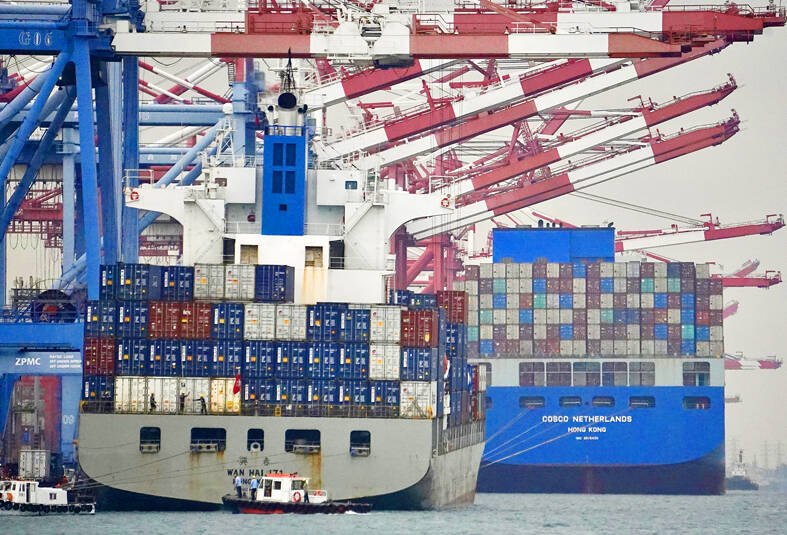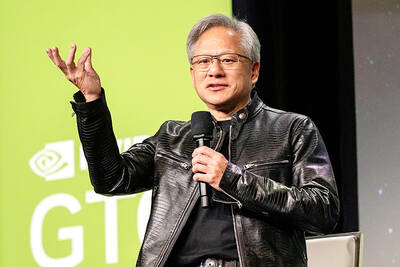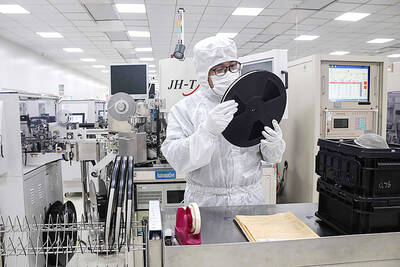Export orders last month surged 31 percent year-on-year to US$49.45 billion, driven by strong demand for servers and chips used in artificial intelligence (AI) and high-performance computing applications, the Ministry of Economic Affairs said yesterday.
New smartphone launches, China’s subsidies program targeting consumer electronics and information technology products, and front-loading orders to avoid US tariffs also helped lift last month’s export orders, the ministry said.
Last month’s figure surpassed the ministry’s estimate of US$43.5 billion to US$45.5 billion.

Photo: CNA
The growth momentum is expected to extend into this month with export orders forecast to expand between 10.3 percent and 14.5 percent to between US$52 billion and US$54 billion, Department of Statistics Director Huang Yu-ling (黃于玲) said by telephone.
That would bring aggregate export orders this quarter to between US$148.4 billion and US$150.4 billion, an annual increase of between 11.3 percent and 12.8 percent, Huang said.
“We are looking at a fourth straight quarter of growth in the first quarter,” Huang said. “AI demand remains strong and healthy.”
The ministry expects Chinese start-up DeepSeek’s (深度求索) low-cost AI models to have a positive impact on Taiwanese companies in the long term on expectations that their affordability would accelerate the uptake of AI applications.
However, non-technology sectors still face pricing competition from overseas rivals due to overcapacity and their prospects remain bleak, Huang said.
In the first two months of the year, export orders for electronic products soared 21.8 percent year-on-year to US$37.35 billion, and those of information and communications technology products increased 6.1 percent to US$25.83 billion, which the ministry attributed to the rising demand for chips, servers and networking products amid the AI boom.
Orders for optoelectronic products rose 7.7 percent to US$3.22 billion during the two-month period, thanks to improved selling prices of large TV panels and higher demand for optical inspection tools, the ministry said.
Machinery and mechanical equipment orders rose 3.5 percent to US$3.03 billion in the first two months, as strong demand for semiconductor equipment offset weak sales of automation systems and machine tools, it said.
Faced with intensifying price competition from overseas rivals, Taiwanese suppliers of base metal, plastic and rubber, and chemical products saw their orders decline 10.7 percent, 8.3 percent and 6.9 percent to US$3.64 billion, US$2.74 billion and US$2.65 billion respectively in the first two months, the ministry said.

‘DECENT RESULTS’: The company said it is confident thanks to an improving world economy and uptakes in new wireless and AI technologies, despite US uncertainty Pegatron Corp (和碩) yesterday said it plans to build a new server manufacturing factory in the US this year to address US President Donald Trump’s new tariff policy. That would be the second server production base for Pegatron in addition to the existing facilities in Taoyuan, the iPhone assembler said. Servers are one of the new businesses Pegatron has explored in recent years to develop a more balanced product lineup. “We aim to provide our services from a location in the vicinity of our customers,” Pegatron president and chief executive officer Gary Cheng (鄭光治) told an online earnings conference yesterday. “We

It was late morning and steam was rising from water tanks atop the colorful, but opaque-windowed, “soapland” sex parlors in a historic Tokyo red-light district. Walking through the narrow streets, camera in hand, was Beniko — a former sex worker who is trying to capture the spirit of the area once known as Yoshiwara through photography. “People often talk about this neighborhood having a ‘bad history,’” said Beniko, who goes by her nickname. “But the truth is that through the years people have lived here, made a life here, sometimes struggled to survive. I want to share that reality.” In its mid-17th to

‘MAKE OR BREAK’: Nvidia shares remain down more than 9 percent, but investors are hoping CEO Jensen Huang’s speech can stave off fears that the sales boom is peaking Shares in Nvidia Corp’s Taiwanese suppliers mostly closed higher yesterday on hopes that the US artificial intelligence (AI) chip designer would showcase next-generation technologies at its annual AI conference slated to open later in the day. The GPU Technology Conference (GTC) in California is to feature developers, engineers, researchers, inventors and information technology professionals, and would focus on AI, computer graphics, data science, machine learning and autonomous machines. The event comes at a make-or-break moment for the firm, as it heads into the next few quarters, with Nvidia CEO Jensen Huang’s (黃仁勳) keynote speech today seen as having the ability to

The battle for artificial intelligence supremacy hinges on microchips, but the semiconductor sector that produces them has a dirty secret: It is a major source of chemicals linked to cancer and other health problems. Global chip sales surged more than 19 percent to about US$628 billion last year, according to the Semiconductor Industry Association, which forecasts double-digit growth again this year. That is adding urgency to reducing the effects of “forever chemicals” — which are also used to make firefighting foam, nonstick pans, raincoats and other everyday items — as are regulators in the US and Europe who are beginning to